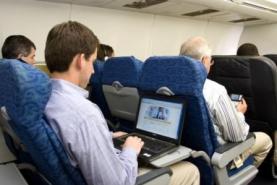
With more airlines offering in-flight internet service to keep up with customer demand and retain a competitive edge (Virgin America has even introduced electrical outlets to keep business passengers plugged in for hours), companies like Broomfield, Colo.-based Aircell are locked in a race for customers. Row 44 (which counts Southwest as its big client), OnAir (which works with Boeing), and Verizon Airfone are looking to expand their market share at the same time.
[aditude-amp id="flyingcarpet" targeting='{"env":"staging","page_type":"article","post_id":155332,"post_type":"story","post_chan":"none","tags":null,"ai":false,"category":"none","all_categories":"business,","session":"B"}']The round of funding should give Aircell’s Gogo Inflight Internet service a big boost. It’s already working on 700 commercial planes across nine airlines. That’s pretty good for a company that’s not even two years old. It helped that it launched with American Airlines, and now it has landed deals with Delta, AirTran, United Airlines, Continental, U.S. Airways, Virgin America, and Air Canada. Those are most of the big names in aviation.
But Aircell and others’ success isn’t based purely on how many airlines they can bring into their fold. Passengers also have to be willing to pay to use the internet while they are on planes. There’s a certain demographic — businesspeople — who need to remain connected at all times, but this is still a pretty niche market. Airlines charge up to $13 for their customers to sign online — a hefty price for several hours of access.
AI Weekly
The must-read newsletter for AI and Big Data industry written by Khari Johnson, Kyle Wiggers, and Seth Colaner.
Included with VentureBeat Insider and VentureBeat VIP memberships.
These prices are closely linked to how expensive it is for airlines to install and operate internet connectivity systems that don’t interfere with flight instrumentation. Aircell’s system costs $100,000 upfront, for instance. But as these companies gain more traction — and funding — their technology will probably become more streamlined and affordable, dropping fees for average passengers. That’s the idea, at least.
Aircell, which has another facility in Illinois that focuses exclusively on building commercial systems, has not disclosed any other investment history.
VentureBeat's mission is to be a digital town square for technical decision-makers to gain knowledge about transformative enterprise technology and transact. Learn More
